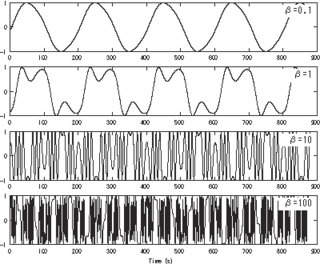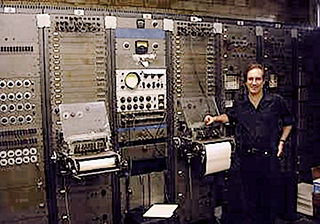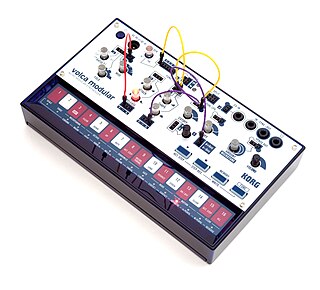Electronic music broadly is a group of music genres that employ electronic musical instruments, circuitry-based music technology and software, or general-purpose electronics in its creation. It includes both music made using electronic and electromechanical means. Pure electronic instruments depended entirely on circuitry-based sound generation, for instance using devices such as an electronic oscillator, theremin, or synthesizer. Electromechanical instruments can have mechanical parts such as strings, hammers, and electric elements including magnetic pickups, power amplifiers and loudspeakers. Such electromechanical devices include the telharmonium, Hammond organ, electric piano and electric guitar.

An electronic musical instrument or electrophone is a musical instrument that produces sound using electronic circuitry. Such an instrument sounds by outputting an electrical, electronic or digital audio signal that ultimately is plugged into a power amplifier which drives a loudspeaker, creating the sound heard by the performer and listener.

Frequency modulation synthesis is a form of sound synthesis whereby the frequency of a waveform is changed by modulating its frequency with a modulator. The (instantaneous) frequency of an oscillator is altered in accordance with the amplitude of a modulating signal.
Subtractive synthesis is a method of sound synthesis in which overtones of an audio signal are attenuated by a filter to alter the timbre of the sound.
A music sequencer is a device or application software that can record, edit, or play back music, by handling note and performance information in several forms, typically CV/Gate, MIDI, or Open Sound Control, and possibly audio and automation data for digital audio workstations (DAWs) and plug-ins.

Modular synthesizers are synthesizers composed of separate modules for different functions. The modules can be connected together by the user to create a patch. The outputs from the modules may include audio signals, analog control voltages, or digital signals for logic or timing conditions. Typical modules are voltage-controlled oscillators, voltage-controlled filters, voltage-controlled amplifiers and envelope generators.

In electronics, ring modulation is a signal processing function, an implementation of frequency mixing, in which two signals are combined to yield an output signal. One signal, called the carrier, is typically a sine wave or another simple waveform; the other signal is typically more complicated and is called the input or the modulator signal. A ring modulator is an electronic device for ring modulation. A ring modulator may be used in music synthesizers and as an effects unit.
Electroacoustic music is a genre of popular and Western art music in which composers use technology to manipulate the timbres of acoustic sounds, sometimes by using audio signal processing, such as reverb or harmonizing, on acoustical instruments. It originated around the middle of the 20th century, following the incorporation of electric sound production into compositional practice. The initial developments in electroacoustic music composition to fixed media during the 20th century are associated with the activities of the Groupe de recherches musicales at the ORTF in Paris, the home of musique concrète, the Studio for Electronic Music in Cologne, where the focus was on the composition of elektronische Musik, and the Columbia-Princeton Electronic Music Center in New York City, where tape music, electronic music, and computer music were all explored. Practical electronic music instruments began to appear in the early 20th century.

The RCA Mark II Sound Synthesizer was the first programmable electronic synthesizer and the flagship piece of equipment at the Columbia-Princeton Electronic Music Center. Designed by Herbert Belar and Harry Olson at RCA, with contributions by Vladimir Ussachevsky and Peter Mauzey, it was installed at Columbia University in 1957. Consisting of a room-sized array of interconnected sound synthesis components, the Mark II gave the user more flexibility and had twice the number of tone oscillators as its predecessor, the Mark I. The synthesizer was funded by a large grant from the Rockefeller Foundation.

A MIDI controller is any hardware or software that generates and transmits Musical Instrument Digital Interface (MIDI) data to MIDI-enabled devices, typically to trigger sounds and control parameters of an electronic music performance. They most often use a musical keyboard to send data about the pitch of notes to play, although a MIDI controller may trigger lighting and other effects. A wind controller has a sensor that converts breath pressure to volume information and lip pressure to control pitch. Controllers for percussion and stringed instruments exist, as well as specialized and experimental devices. Some MIDI controllers are used in association with specific digital audio workstation software. The original MIDI specification has been extended to include a greater range of control features.

Buchla Electronic Musical Instruments (BEMI) was a manufacturer of synthesizers and unique MIDI controllers. The origins of the company could be found in Buchla & Associates, created in 1963 by synthesizer pioneer Don Buchla of Berkeley, California. In 2012 the original company led by Don Buchla was acquired by a group of Australian investors trading as Audio Supermarket Pty. Ltd. The company was renamed Buchla Electronic Musical Instruments as part of the acquisition. In 2018 the assets of BEMI were acquired by a new entity, Buchla U.S.A., and the company continues under new ownership.

Moog Music Inc. is an American synthesizer company based in Asheville, North Carolina. It was founded in 1953 as R. A. Moog Co. by Robert Moog and his father and was renamed Moog Music in 1972. Its early instruments included the Moog synthesizer, followed by the Minimoog in 1970, both of which were highly influential electronic instruments.

The Moog synthesizer is a modular synthesizer invented by the American engineer Robert Moog in 1964. Moog's company, R. A. Moog Co., produced numerous models from 1965 to 1981, and again from 2014. It was the first commercial synthesizer and established the analog synthesizer concept.

Donald Buchla was an American pioneer in the field of sound synthesis. Buchla popularized the "West Coast" style of synthesis. He was co-inventor of the voltage controlled modular synthesizer along with Robert Moog, the two working independently in the early 1960s.

The Korg MS2000 is a virtual analog synthesizer produced by the Japanese electronic musical instrument manufacturer Korg.

A synthesizer is an electronic musical instrument that generates audio signals. Synthesizers typically create sounds by generating waveforms through methods including subtractive synthesis, additive synthesis and frequency modulation synthesis. These sounds may be altered by components such as filters, which cut or boost frequencies; envelopes, which control articulation, or how notes begin and end; and low-frequency oscillators, which modulate parameters such as pitch, volume, or filter characteristics affecting timbre. Synthesizers are typically played with keyboards or controlled by sequencers, software or other instruments, and may be synchronized to other equipment via MIDI.

The AX80 is a polyphonic analogue keyboard synthesizer manufactured by Akai Professional in 1984. It was Akai's first venture into the professional electronic musical instrument market. The AX80 used digitally controlled oscillators (DCO) and filter circuitry based on the Curtis Electronics CEM 3372 integrated circuit. It was marketed as part of a line of project studio equipment called the Akai Music Studio System, which included the S612 digital sampler the MR16 drum machine, the MS08 sequencer, and the MG1212 multitrack tape recorder.

TIMARA is a program at the Oberlin Conservatory of Music notable for its importance in the history of electronic music. Established in 1967, TIMARA is well known as the world's first conservatory program in electronic music. Department alumni have included Cory Arcangel, Christopher Rouse, Dary John Mizelle, Dan Forden and Amy X Neuburg.

The Volca Modular is an analogue synthesizer manufactured by the Japanese music technology company Korg. It is part of their popular Volca series of affordable electronic synthesizers and drum machines. Like other Volcas, it sports a 16-step sequencer and can be powered by batteries.















